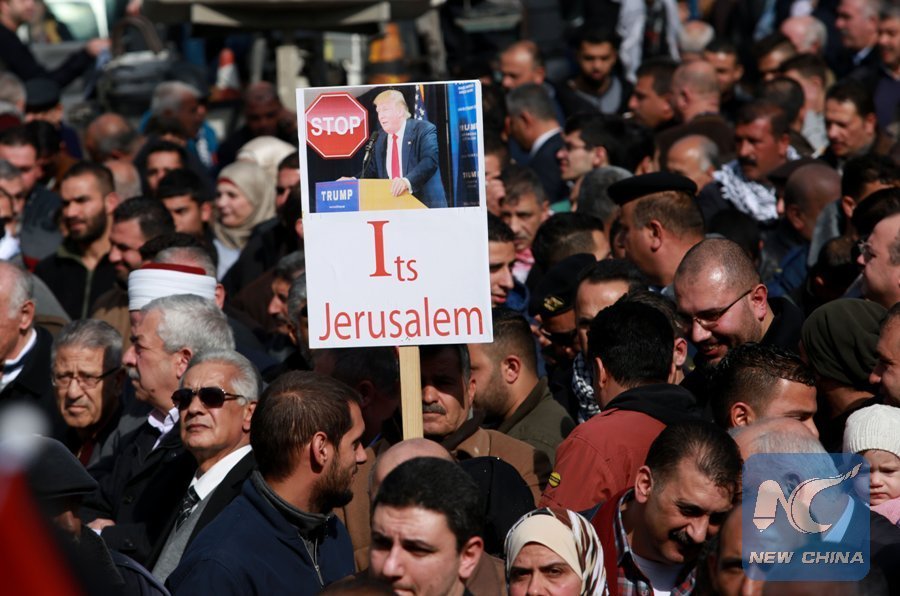
File Photo: A Palestinian holds a placard against U.S. President-elect Donald Trump during a protest in the West Bank city of Nablus, on Jan. 19, 2017. Thousands of Palestinians demonstrated in the West Bank against the U.S. President-elect Donald Trump's intention to move the American embassy from Tel Aviv to Jerusalem. (Xinhua/Ayman Nobani)
WASHINGTON, Oct. 3 (Xinhua) -- U.S. National Security Adviser John Bolton said here on Wednesday that the United States will review all international agreements it believes work against the country.
Speaking at a White House press briefing, Bolton said that "the president has decided that the United States will withdraw from the Optional Protocol on Dispute Resolution to the Vienna Convention on Diplomatic Relations."
"This is in connection with a case brought by the so-called State of Palestine naming the United States as a defendant, challenging our move of our embassy from Tel Aviv to Jerusalem," he said.
Palestinian Foreign Minister Riyad Malki said on Saturday that Palestine has filed a legal complaint against the United States to the International Court of Justice (ICJ) over moving its embassy in Israel to Jerusalem.
Malki said in a statement that the case was based on Palestine's membership in the 1961 Vienna Convention on Diplomatic Relations which defines a framework for diplomatic relations between independent countries.
The foreign minister asked the ICJ to declare that the relocation of the U.S. embassy to Jerusalem as a violation of the Vienna Convention on Diplomatic Relations.
The Palestinians want East Jerusalem as the capital of their future independent state, while Israel wants all of Jerusalem to be its eternal capital. Israel annexed East Jerusalem in the 1967 war and declared the whole city as its eternal indivisible capital in 1980, but the move has not been recognized by the international community.
The Palestinians have been boycotting the United States since it recognized Jerusalem as Israel's capital and moved its embassy in Israel to Jerusalem.
Bolton said that Palestine will not become a state.
"It's not a state now," he said. "It could become a state, as the president said; but that requires the diplomatic negotiations with Israel and others."
Earlier on Wednesday, U.S. Secretary of State Mike Pompeo said that the United States is terminating the 1955 Treaty of Amity with Iran, citing a verdict issued by the Hague-based ICJ that Washington sees as being manipulated by Iran.
The verdict, issued following U.S. withdrawal from the 2015 Iran nuclear deal, said that the restoration of sanctions against Iran by Trump violate the terms of the treaty between the two countries.
It ordered the United States to ensure that its sanctions against Iran will not affect the humanitarian condition or threaten civil aviation safety.
Although Bolton said that "the United States remains a party to the underlying Vienna Convention on Diplomatic Relations," he noted that "given this history and Iran's abuse of the ICJ, we will commence a review of all international agreements that may still expose the United States to purported binding jurisdiction, dispute resolution in the International Court of Justice, the United States will not sit idly by as baseless, politicized claims are brought against us."
After Pompeo's announcement, Iranian Foreign Minister Mohammad Javad Zarif tweeted that "US abrogated JCPOA -- a multilateral accord enshrined in UNSC Resolution 2231 -- arguing that it seeks a bilateral treaty with #Iran."
"Today US withdrew from an actual US-Iran treaty after the ICJ ordered it to stop violating that treaty in sanctioning Iranian people. Outlaw regime," he noted.
In May, Trump announced Washington's withdrawal from the landmark Iranian nuclear deal. Since then, the Trump administration has slapped a number of sanctions on Iran while vowing to apply more in November.

